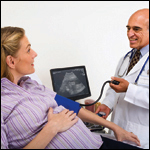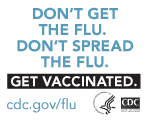One Test. Two Lives. HIV Screening for Prenatal Care
 Since CDC began recommending routine HIV screening for all pregnant women in 1995, the estimated incidence of mother-to-child transmission has dropped by approximately 85 percent. However, mother-to-child HIV transmission continues in the United States in part because many pregnant women are still not being tested.
Since CDC began recommending routine HIV screening for all pregnant women in 1995, the estimated incidence of mother-to-child transmission has dropped by approximately 85 percent. However, mother-to-child HIV transmission continues in the United States in part because many pregnant women are still not being tested.
CDC's One Test. Two Lives. campaign gives healthcare providers tools to test pregnant women for HIV infection and help reduce the number of infants born with HIV.
 CDC recommends HIV screening for all women as a standard part of prenatal care in order to identify and treat HIV in pregnant women and to prevent transmission of HIV to infants. Women who test positive for HIV and begin treatment early in their pregnancy reduce the risk of transmitting HIV to their baby to 2 percent. CDC's One Test. Two Lives. campaign gives obstetricians, nurse-midwives, and other providers tools to ensure that all of their patients have the opportunity to learn their HIV status as a routine part of prenatal care and to protect their newborns from HIV infection. Kevin Ault, MD, Associate Professor of Gynecology and Obstetrics at Emory University's School of Medicine and a consultant to the campaign, commented, "All pregnant women want the best for their children, and routine prenatal HIV testing is part of that equation."
CDC recommends HIV screening for all women as a standard part of prenatal care in order to identify and treat HIV in pregnant women and to prevent transmission of HIV to infants. Women who test positive for HIV and begin treatment early in their pregnancy reduce the risk of transmitting HIV to their baby to 2 percent. CDC's One Test. Two Lives. campaign gives obstetricians, nurse-midwives, and other providers tools to ensure that all of their patients have the opportunity to learn their HIV status as a routine part of prenatal care and to protect their newborns from HIV infection. Kevin Ault, MD, Associate Professor of Gynecology and Obstetrics at Emory University's School of Medicine and a consultant to the campaign, commented, "All pregnant women want the best for their children, and routine prenatal HIV testing is part of that equation."
Since CDC began recommending routine HIV screening for all pregnant women in 1995, the estimated incidence of mother-to-child transmission has dropped by approximately 85 percent. This decrease can be attributed to routine screening and the use of antiretroviral medications; however, mother-to-child HIV transmission does continue in the United States, in part because many pregnant women are still not being tested. Data suggest that in recent years roughly 35–40 percent of mothers who gave birth to HIV-infected infants were unaware of their infection prior to labor and delivery.
Campaign Uses Simple Messages to Encourage Prenatal HIV Screening
 One Test. Two Lives. emphasizes three points:
One Test. Two Lives. emphasizes three points:
- Pregnant women are likely to get tested if their providers strongly recommend it. In a study of 1,362 pregnant women, 93 percent of women who felt their providers strongly recommended an HIV test decided to get tested.
- Screening for HIV early in pregnancy, preferably at the first obstetrical visit, benefits both mothers and babies. Women with HIV who start treatment early and maintain it throughout their pregnancy protect their own health and rarely pass HIV to their infants. Women who have not been tested or have increased risk for HIV should be tested in the third trimester as well.
- It is never too late for pregnant women to get tested. With the availability of rapid HIV tests, women who arrive at delivery rooms with unknown HIV status can still receive an HIV test. Preventive medications administered to the mother during labor, and to the infant after birth, can reduce the risk of mother-to-child HIV transmission to about 10 percent. Some clinicians may also test a pregnant patient late in the third trimester of pregnancy.
Campaign Provides Tools to Overcome Barriers to Prenatal HIV Screening
 One Test. Two Lives. offers a range of provider materials to help facilitate screening in prenatal settings such as CDC's guide to using an opt-out approach to HIV screening and a tip sheet for talking to patients about HIV screening. A patient brochure, a fact sheet on recommended prenatal tests, and a display poster for medical offices are also available to ensure that patients are aware of the facts and benefits of HIV screening.
One Test. Two Lives. offers a range of provider materials to help facilitate screening in prenatal settings such as CDC's guide to using an opt-out approach to HIV screening and a tip sheet for talking to patients about HIV screening. A patient brochure, a fact sheet on recommended prenatal tests, and a display poster for medical offices are also available to ensure that patients are aware of the facts and benefits of HIV screening.
Campaign materials are available on the campaign Web site: www.cdc.gov/1test2lives or by calling the National Prevention Information Network at 1-800-458-5231.
"This is another opportunity to carry out our mission to protect women's and children's health, put prevention first, and decrease the impact of HIV/AIDS in newborns. These additional resources will help clinicians talk to their pregnant patients about important tests for a healthy pregnancy," noted Yvonne Green, Director of the Office of Women's Health at CDC and a consultant to the One Test. Two Lives. campaign.
More Information
- About the Campaign
- Questions and Answers
- Educational Materials
- Order Free Materials
- Supporting Documents
- Campaign Events
- Links to more information about perinatal HIV transmission


